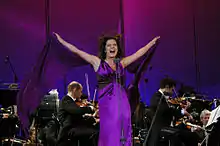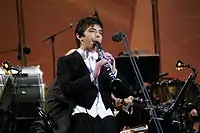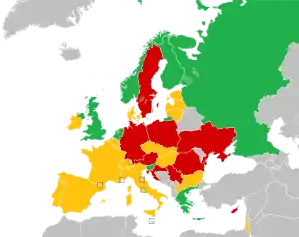Eurovision Young Musicians 2008
The Eurovision Young Musicians 2008 was the fourteenth edition of the Eurovision Young Musicians, held at the Rathausplatz in Vienna, Austria on 9 May 2008.[2] Organised by the European Broadcasting Union (EBU) and host broadcaster Österreichischer Rundfunk (ORF), musicians from seven countries participated in the televised final. This was the second time that the competition was held on an open-air stage and was the beginning of the annual Vienna Festival. Austria and broadcaster ORF previously hosted the contest in 1990, 1998 and 2006.[2]
| Eurovision Young Musicians 2008 | |
|---|---|
| Dates | |
| Semi-final 1 | 4 May 2008 |
| Semi-final 2 | 5 May 2008 |
| Final | 9 May 2008 |
| Host | |
| Venue | Semi-final: Theater an der Wien Final: Rathausplatz, Vienna, Austria |
| Presenter(s) | Lidia Baich Christoph Wagner-Trenkwitz |
| Musical director | Aleksandar Markovic |
| Directed by | Heidelinde Haschek |
| Executive supervisor | Tal Barnea |
| Executive producer | Michael Heinzl |
| Host broadcaster | Österreichischer Rundfunk (ORF) |
| Website | youngmusicians |
| Participants | |
| Number of entries | 16 (7 qualified) |
| Debuting countries | |
| Returning countries | |
| Non-returning countries | |
Participation map
| |
| Vote | |
| Voting system | Each juror awarded a mark from 1–10 to each performer |
| Winning musician | Dionysis Grammenos |
A total of sixteen countries took part in the competition therefore a semi-final was held at the Theater an der Wien on 4 and 5 May 2008. All participants performed a classical piece of their choice accompanied by the Vienna Symphony Orchestra, conducted by Aleksandar Markovic.[2] Serbia (as an independent nation) and Ukraine made their début while Germany returned. Five countries decided not to participate, they were Belgium, Bulgaria, Czech Republic, Serbia and Montenegro and Switzerland.[2]
Dionysios Grammenos of Greece won the contest, with Finland and Norway placing second and third respectively. Grammenos is the first woodwind player to win the competition (previous winners have played piano, violin or cello). A new feature in 2008 was the audience prize, voted for by television viewers in the host country via SMS. The third prize winning Norwegian violinist Eldbjørg Hemsing was the winner of this public vote.[3]
Location
.jpg.webp)
Rathausplatz, a square outside the Wiener Rathaus city hall of Vienna, was the host location for the 2008 edition of the Eurovision Young Musicians final. The Theater an der Wien, a theatre in Vienna, Austria, hosted the semi-final round.[2]
Format

Lidia Baich and Christoph Wagner-Trenkwitz were the hosts of the 2008 contest. The interval act was Angelika Kirchschlager performing "One Life to Live" alone and "We Dream Together" with the Vienna Boys' Choir.[2]
Results
Semi-final
A total of sixteen countries took part in the semi-final round of the 2008 contest, of which seven qualified to the televised grand final.[2]
Part 1 (4 May)
| Draw | Country | Performer | Instrument | Piece(s) | Result |
|---|---|---|---|---|---|
| 01 | Marin Maras | Violin |
1) Sonata in c minor (Largo-Allegro moderato) (Francesco Geminiani) |
Failed to qualify | |
| 02 | Philip Achille | Harmonica | 1) Little Suite (James Moody) | Qualified | |
| 03 | Sol Daniel Kim | Cello |
1) 1st Movement of the Sonata for Arpeggione and Piano (Franz Schubert) |
Failed to qualify | |
| 04 | Anna Fedorova | Piano |
1) Sonata, Op. 57, I mv. (Ludwig van Beethoven) |
Failed to qualify | |
| 05 | Kathy Kang | Violin |
1) Sonata for violin and piano, 2. sentence - Allegro (César Franck) |
Failed to qualify | |
| 06 | Maria Verbaite | Piano |
1) Sonate in C-Dur Hob. XVI:50 (Joseph Haydn) |
Failed to qualify | |
| 07 | Stefan Besan | Violin |
1) The Strolling Fiddler for Violin solo, from the Suite (George Enescu) |
Failed to qualify | |
| 08 | Dionysios Grammenos | Clarinet |
1) Three Pieces for Clarinet solo (Igor Stravinsky) |
Qualified | |
Part 2 (5 May)
| Draw | Country | Performer | Instrument | Piece | Result |
|---|---|---|---|---|---|
| 09 | Roope Gröhdahl | Piano |
1) Bagatelle G-Moll, Op. 119, No. 1 (Ludwig van Beethoven) |
Qualified | |
| 10 | Steven Bourne | Cello |
1) Sonata for Cello and Piano (Claude Debussy) |
Qualified | |
| 11 | Jan Gricar | Saxophone |
1) Fantasie sur un theme original (Jules Demersseman) |
Qualified | |
| 12 | Eldbjørg Hemsing | Violin |
1) Tzigane (rapsodie de Concert) (Maurice Ravel) |
Qualified | |
| 13 | Mina Zakić | Cello |
1) Impromptu G-Dur, Op.90 (Franz Schubert) |
Failed to qualify | |
| 14 | Orfeas Hiratos | Clarinet |
1) Sonáta: Allegro (Franz Danzi) |
Failed to qualify | |
| 15 | Anastasia Kobekina | Cello |
1) Rondo (Luigi Boccherini) |
Qualified | |
| 16 | Marta Kowalczyk | Violin |
1) Fantasie Brillante sur Gounod's "Faust" op.20 (Henryk Wieniawski) |
Failed to qualify |
Final

Awards were given to the top three countries. The table below highlights these using gold, silver, and bronze. The placing results of the remaining participants is unknown and never made public by the European Broadcasting Union.[3]
| Draw | Country | Performer | Instrument | Piece | Result |
|---|---|---|---|---|---|
| 01 | Jan Cricar | Saxophone | Pequeña Czarda by Pedro Iturralde | - | |
| 02 | Anastasia Kobekina | Cello | Concerto for Cello and Orchestra in C Major, 1st movement by Joseph Haydn | - | |
| 03 | Philip Achille | Harmonica | Concerto for Chromatic Harmonica and Orchestra, 1st movement by Jascha Spivakovsky | - | |
| 04 | Roope Gröndahl | Piano | Concerto for Piano and Orchestra in B-flat Minor, 3rd movement by Peter Tchaikovsky | 2 | |
| 05 | Dionysios Grammenos | Clarinet | Concerto for Clarinet and Orchestra, 4th movement by Jean Francaix | 1 | |
| 06 | Steven Bourne | Cello | Elegie by Gabriel Fauré | - | |
| 07 | Eldbjørg Hemsing | Violin | Carmen Fantasie by Franz Waxman | 3 | |
Jury members
The jury members consisted of the following:[2]
Semi-final
 Netherlands – Jeanette de Boer
Netherlands – Jeanette de Boer Austria – Günter Voglmayr
Austria – Günter Voglmayr Austria – Franz Bartolomey
Austria – Franz Bartolomey Austria – Ranko Marković
Austria – Ranko Marković Poland – Kaja Danczowska
Poland – Kaja Danczowska Poland – Jerzy Maksymiuk
Poland – Jerzy Maksymiuk
Final
 United Kingdom – Sir Roger Norrington (head)
United Kingdom – Sir Roger Norrington (head) Austria – Ranko Markovic
Austria – Ranko Markovic Netherlands/
Netherlands/ Austria – Jeanette de Boer
Austria – Jeanette de Boer Norway – Lars Anders Tomter
Norway – Lars Anders Tomter Austria – Günter Voglmayr
Austria – Günter Voglmayr United Kingdom – Alison Balsom
United Kingdom – Alison Balsom
Broadcasting
The competition was transmitted live over the Eurovision Network by 18 broadcasters. Iceland and Lithuania broadcast the contest in addition to the competing countries.[4]
| Country | Broadcaster(s) |
|---|---|
| ORF | |
| HRT | |
| CyBC | |
| ČT | |
| Yle | |
| WDR | |
| ERT | |
| NPS | |
| NRK | |
| TVP | |
| TVR | |
| KTVC | |
| RTS | |
| RTVSLO | |
| SVT | |
| NTU | |
| BBC |
| Country | Broadcaster |
|---|---|
| RÚV | |
| LRT | |
See also
References
- State Union of Serbia and Montenegro did not exist since 2006.
- "Eurovision Young Musicians 2008: About the show". European Broadcasting Union. Archived from the original on 5 August 2016. Retrieved 5 October 2014.
- "Eurovision Young Musicians 2008: Participants". youngmusicians.tv. European Broadcasting Union. Archived from the original on 5 August 2016. Retrieved 5 October 2014.
- "Eurovision Young Musicians - Final Press Release". youngmusicians.tv. EBU. 12 May 2008. Archived from the original on 12 May 2008. Retrieved 3 May 2018.
External links
- Official website
- Pictures from the Eurovision Young Musicians 2008 Finale in Vienna
